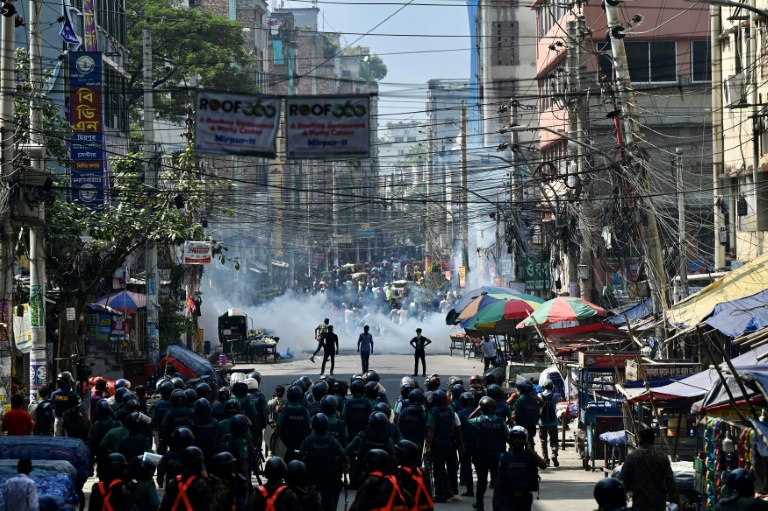
Bangladesh police (foreground) stand guard clashes with garment workers (top)demanding higher wages
Munir uz ZAMAN
Levi’s and H&M are among top global clothing brands to suffer production halts in Bangladesh, a garment union leader said Friday, after days of violent protests by workers demanding a near-tripling of their wages.
Bangladesh’s 3,500 garment factories account for around 85 percent of the South Asian country’s $55 billion annual exports, supplying many of the world’s top names in fashion.
But conditions are dire for many of the sector’s four million workers, the vast majority of whom are women whose monthly wages start at 8,300 taka ($75).
Dozens of factories have been ransacked by striking workers, with several hundred others shuttered by their owners to avoid vandalism.
Among them are “many of the country’s bigger factories, who make clothing for almost all major Western brands and retailers,” Kalpona Akter, president of the Bangladesh Garments and Industrial Workers Federation (BGIWF), told AFP.
“They include Gap, Walmart, H&M, Zara, Inditex, Bestseller, Levi’s, Marks and Spencer, Primark and Aldi,” she added.
There was no immediate confirmation from the brands Akter named of disruptions to their production in Bangladesh.
Manufacturers whose factories have been damaged in the protests are reluctant to give the names of brands they work with, fearing the loss of orders from buyers.

Dozens of factories have been ransacked by striking workers, with several hundred others shuttered by their owners to avoid vandalism
Munir uz zaman
Police said at least 300 factories had been shut down in the weeklong protests, which have so far left two workers dead and dozens more injured.
Akter said her union had counted around 600 affected factories.
Protests continued on Friday with thousands of garment workers mobilising on the streets of industrial neighbourhoods around the capital Dhaka.
Around 3,000 workers attempted to block their colleagues from joining a factory shift after two major manufacturers — HaMeem and Sterling groups — reopened their plants.
“Police fired tear gas to disperse the protesters,” a police inspector charged with monitoring the protests, who spoke on condition of anonymity, told AFP.
“The two companies declared a holiday for the day and their 25,000 workers went home.”
Garment workers say that a sharp increase in living costs has left them struggling to provide for their families.
The Bangladesh Garment Manufacturers and Exporters Association (BGMEA), which represents factory owners, has offered workers a 25 percent pay raise.

Garment workers say that a sharp increase in living costs has left them struggling to provide for their families
Munir uz ZAMAN
That is significantly short of the 23,000 taka ($209) monthly wage that the protest campaign has called for.
Police said manufacturers in Gazipur, Dhaka’s biggest industrial hub that saw the worst of this week’s violence, had decided to reopen their plants from Saturday to make up for lost shifts.
“We will deploy nearly 3,000 police and border guards to prevent any violence,” Gazipur police chief Sarwar Alam told AFP.
He urged the workers to stop the violence and find a solution through dialogue.
“I think the demands of workers are logical. But taking the law into their own hands won’t help their cause,” Alam added.
The protests have coincided with separate violent demonstrations by opposition parties demanding the resignation of Prime Minister Sheikh Hasina ahead of elections due in January.
